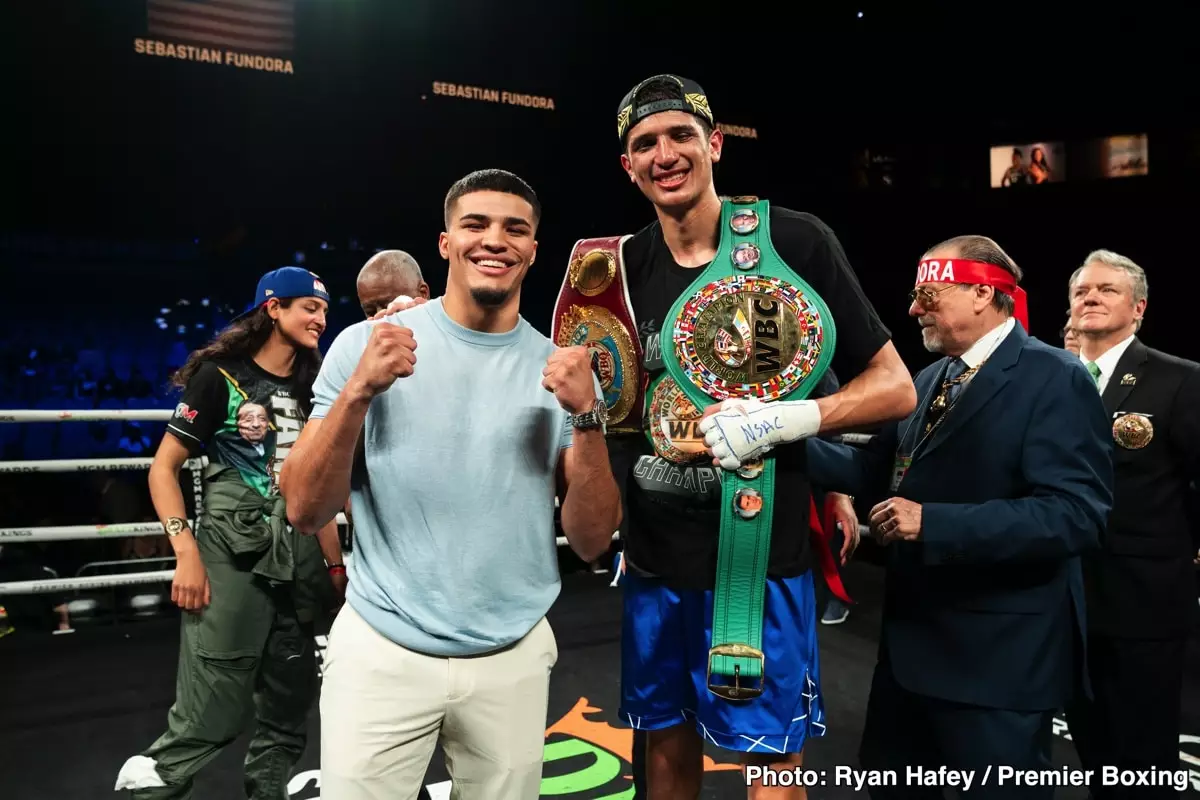Xander Zayas, the WBO mandatory challenger, recently made headlines with an audacious attempt to initiate a face-off with the reigning WBC and WBO junior middleweight champion, Sebastian Fundora. Following Fundora’s impressive fourth-round technical knockout of Chordale Booker in Las Vegas, Zayas seized the opportunity to confront the champion in his dressing room. Yet, this calculated risk swiftly turned sour as Fundora and his promoter, Sampson Lewkowicz, refused to entertain a fight with Zayas. The reality here is that ambition does not always correlate with opportunity—a lesson Zayas learned the hard way.
Opportunism in boxing is common, but Zayas’ bravado may have backfired. He jumped the gun in promoting what could have been a high-profile showdown, flaunting his intention without proper groundwork or acknowledgment from Fundora’s camp. The outcome was predictably unsatisfactory, revealing a stark truth in boxing: it’s not just about wanting a fight; it’s about timing, marketing appeal, and financial viability.
The Financial Dynamics of Championship Boxing
One glaring reason behind Fundora’s refusal is the financial arithmetic that governs high-stakes boxing. Zayas, while a promising fighter, has limited mainstream appeal compared to the seasoned Fundora. Fundora’s team is apparently more focused on securing the highest-paying bouts rather than engaging with a challenger who has yet to capture the public’s imagination. The champions of boxing, in this economic climate, are no longer simply fighters; they are brands seeking lucrative contracts. Zayas, at this stage, is known primarily to committed boxing enthusiasts and the Puerto Rican community—not the kind of draw that entices a champion looking for big-money matches.
The impending pressure from the WBO for Fundora to defend against Zayas adds another layer of complexity. While the governing body has made it clear that the champion must act within 120 days or risk losing his title, Fundora’s camp appears to be calmly dismissive of this ultimatum, knowing full well the landscape of the sport. Interest in unifying the weight class is crucial, but with champion Terence Crawford preoccupied and the IBF champion Bakhram Murtazaliev being an uncertain danger, Fundora’s path is fraught with challenges.
The Pathway to Mandatory Status: Questions Emerge
Zayas earned his mandatory position through a lackluster fight against Slawa Spomer, a boxer who was largely unknown and untested against high-level competition. The WBO’s choice to sanction this as a title eliminator raises eyebrows; it suggests a prioritization of Zayas’ convenience over rigorous competition, potentially diminishing the title’s credibility. Zayas’ ascent through the ranks, without facing particularly notable opponents like Charles Conwell, invites a critique of how mandatory contenders are cultivated in the sport.
Should Zayas have fought someone with proven merit to legitimize his ascent? It poses a significant question for boxing authorities who are responsible for maintaining the integrity of championship ladder rankings. Boxing is often a brutal sport—both in the ring and in its internal politics. A more rigorous approach by the WBO could have paved a clearer and more respectable path for Zayas and others vying for championship glory.
A Critical Moment for Xander Zayas
In light of these dynamics, Zayas finds himself at a critical juncture in his career. His recent actions reflect a fighter eager to establish himself in a world where opportunities are not merely handed out based on merit but earned through visibility and marketability. Confronting a champion is one thing, but the challenge lies in building a narrative compelling enough for promoters and fans alike to rally behind.
His insistence that he is “mandatory for a reason” indicates a strong sense of self-awareness about his place in the sport, yet it also underscores the necessity for strategic planning moving forward. Entering discussions about potential fights with relevance, allure, and financial backing is now imperative for Zayas as he navigates the treacherous landscape of professional boxing.
The boxing world is an unpredictable arena where ambition can often lead to disillusionment. For Zayas, the question remains: How will he cultivate both his fighting prowess and his market presence to eventually turn his ambitious aspirations into tangible outcomes? Only time—and strategic maneuvering—will tell.

